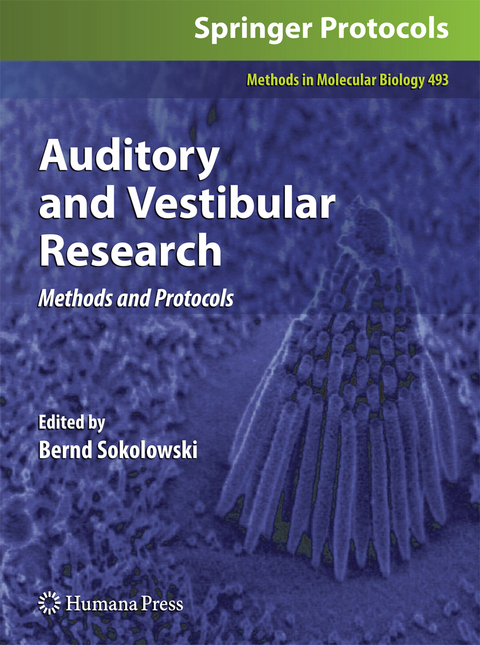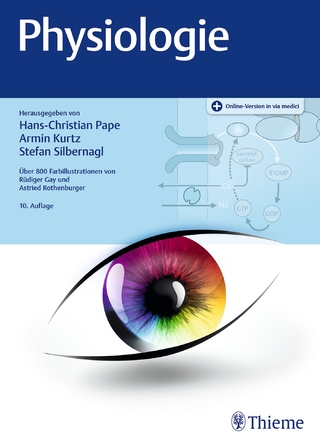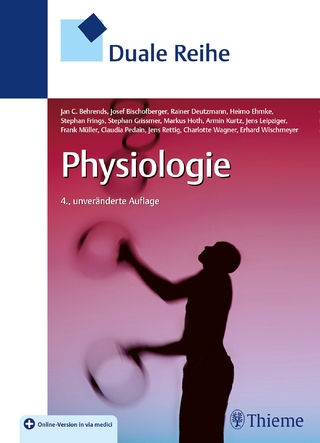
Auditory and Vestibular Research
Humana Press Inc. (Verlag)
978-1-61737-939-0 (ISBN)
Nucleic Acid Protocols.- RNA Isolation from Xenopus Inner Ear Sensory Endorgans for Transcriptional Profiling and Molecular Cloning.- Synthesis of Biotin-Labeled RNA for Gene Expression Measurements Using Oligonucleotide Arrays.- In situ Hybridization Approach to Study mRNA Expression and Distribution in Cochlear Frozen Sections.- Lineage Analysis of Inner Ear Cells Using Genomic Tags for Clonal Identification.- Genetic Fate-Mapping Approaches: New Means to Explore the Embryonic Origins of the Cochlear Nucleus.- The Practical Use of Cre and loxP Technologies in Mouse Auditory Research.- Helios® Gene Gun–Mediated Transfection of the Inner Ear Sensory Epithelium.- Electroporation-Mediated Gene Transfer to the Developing Mouse Inner Ear.- Isolation of Sphere-Forming Stem Cells from the Mouse Inner Ear.- Molecular Biology of Vestibular Schwannomas.- Multilocus Sequence Typing and Pulsed Field Gel Electrophoresis of Otitis Media Causing Pathogens.- Fluorescence “In Situ” Hybridization for the Detection of Biofilm in the Middle Ear and Upper Respiratory Tract Mucosa.- Positional Cloning of Deafness Genes.- Amino Acid Protocols.- Twist-Off Purification of Hair Bundles.- Yeast Two-Hybrid Screening to Test for Protein–Protein Interactions in the Auditory System.- The Use of 2-D Gels to Identify Novel Protein–Protein Interactions in the Cochlea.- Identification of Functionally Important Residues/Domains in Membrane Proteins Using an Evolutionary Approach Coupled with Systematic Mutational Analysis.- In Vivo Verification of Protein Interactions in the Inner Ear by Coimmunoprecipitation.- Identification of Transcription Factor–DNA Interactions Using Chromatin Immunoprecipitation Assays.- Surface Plasmon Resonance (SPR) Analysis of Binding Interactions of Proteins inInner-Ear Sensory Epithelia.- Multiplexed Isobaric Tagging Protocols for Quantitative Mass Spectrometry Approaches to Auditory Research.- Imaging Protocols.- Fluorescence Microscopy Methods in the Study of Protein Structure and Function.- Ion Imaging in the Cochlear Hair Cells.- Atomic Force Microscopy in Studies of the Cochlea.
| Erscheint lt. Verlag | 20.1.2011 |
|---|---|
| Reihe/Serie | Methods in Molecular Biology ; 493 |
| Zusatzinfo | 13 Illustrations, color; 48 Illustrations, black and white; XII, 428 p. 61 illus., 13 illus. in color. |
| Verlagsort | Totowa, NJ |
| Sprache | englisch |
| Maße | 193 x 260 mm |
| Themenwelt | Medizin / Pharmazie ► Medizinische Fachgebiete ► Neurologie |
| Studium ► 1. Studienabschnitt (Vorklinik) ► Physiologie | |
| Studium ► 2. Studienabschnitt (Klinik) ► Humangenetik | |
| Studium ► 2. Studienabschnitt (Klinik) ► Pathologie | |
| Naturwissenschaften ► Biologie | |
| ISBN-10 | 1-61737-939-5 / 1617379395 |
| ISBN-13 | 978-1-61737-939-0 / 9781617379390 |
| Zustand | Neuware |
| Informationen gemäß Produktsicherheitsverordnung (GPSR) | |
| Haben Sie eine Frage zum Produkt? |
aus dem Bereich


